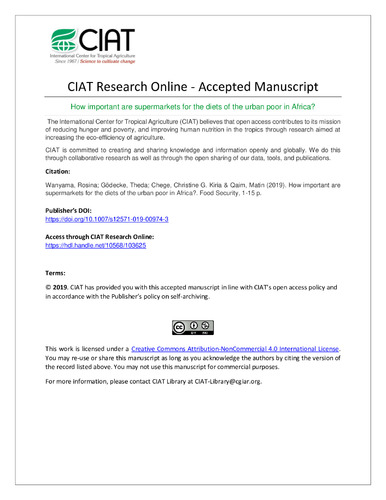How important are supermarkets for the diets of the urban poor in Africa?
Many developing countries are undergoing a profound transformation of food systems and retail environments. Especially in urban areas, a rapid growth of supermarkets is observed, which can affect consumer food choices and diets. Supermarkets may improve access to diverse foods at affordable prices, but may also encourage a switch from unprocessed to highly-processed and energy-dense foods that contribute to obesity. However, the use of supermarkets is positively correlated with income. That supermarkets already play an important role for the diets of many urban consumers does not necessarily mean that this is also true for the poorest population segments that are of particular interest for development policy. This article analyzes the diets and food purchase patterns of poor urban consumers in Kenya and Uganda. Representative data were collected from households in the slums of Nairobi and Kampala. The data show that the majority of these households are undernourished. They buy most food items in unprocessed form from various traditional retail outlets, including mom-and-pop shops, local markets, and kiosks. Relatively few sample households buy any of their food in supermarkets. Supermarkets account for only 3% and 0.4% of all food expenditures of slum dwellers in Nairobi and Kampala, respectively. Reasons for the low supermarket use of these poor households are discussed. The findings suggest that a focus on the modern retail sector alone will not suffice to ensure food and nutrition security for all.

